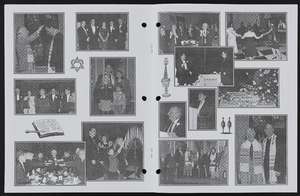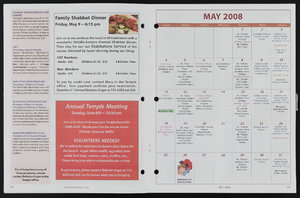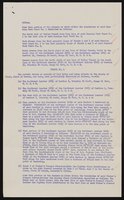Search the Special Collections and Archives Portal
Search Results
Alice P. Broudy Papers on Broudy v. United States
Identifier
Abstract
The Alice P. Broudy Papers on Broudy v United States (1940-2018) comprise materials collected and created by the wife of Charles A. Broudy during her effort to obtain compensation for his death in 1977, which she believed to be a result of repeated radiation exposure. Materials include government documents obtained through the Freedom of Information Act (FOIA), correspondence, memos, litigation papers, scholarly reports and articles on radiation exposure and its effects, congressional testimony, speeches, newspaper clippings, books and audiovisual materials. Also included are photographs, slides, and one box of Alice "Pat" Broudy's personal papers. There are two boxes of papers that remain unprocessed.
Archival Collection
James Cashman Sr. Photograph Collection
Identifier
Abstract
The James Cashman Sr. Photograph Collection (approximately 1905 to 1975) consists of black-and-white photographic prints, negatives, slides, and albums as well as a glass plate negative. The photographs depict four major subjects: Cashman's family, friends, and associates; Cashman's businesses; the Hoover Dam and Colorado River; and various locations across Nevada.
Archival Collection
Tom Hawley Papers
Identifier
Abstract
The Tom Hawley Papers (approximately 1955-2019) contain the personal papers of Las Vegas, Nevada based traffic and transportation reporter, Tom Hawley. The collection primarily includes physical and digital materials that represent Hawley's interests in Las Vegas history; transportation issues in the Las Vegas Valley, including the Las Vegas Monorail and Resort Corridor Project; and his work as a traffic and transportation reporter for KSNV Channel 3. Materials from KSNV include video clips and transcripts of
Archival Collection
Mollie Gregory Collection of Oral Histories
Identifier
Abstract
The Mollie Gregory Collection of Oral Histories contains audio interviews and brief transcripts that focus on welfare, family, and women's issues in Nevada from 1970 to 1974. Gregory interviewed Nevada residents including Maya Miller, Ruby Duncan, and Mary Wesley, who described their lives during the anti-poverty and women's rights campaigns in the early 1970s. The collection documents views on welfare; the Equal Rights Amendment; race, discrimination, and civil rights; and political campaigns.
Archival Collection
Julius Jensen Professional Papers
Identifier
Abstract
The Julius Jensen Professional Papers (1630-1979) consist of medical research notes, medical journal reprints, manuscript and article drafts, professional and personal correspondence, business and financial records, investment information, travel information, photographic prints, art prints, and collectible books and magazines.
Archival Collection
Charles Vanda Collection
Identifier
Abstract
The Charles Vanda Collection (1955-1987) is comprised of achievement awards, plaques, and certificates that were presented to Charles Vanda throughout his career as a television and radio writer, director, and producer. Also included are newspaper clippings and articles about Charles Vanda, the performing arts, and the University of Nevada, Las Vegas (UNLV), a doctoral hood and a UNLV Runnin' Rebels jacket.
Archival Collection




